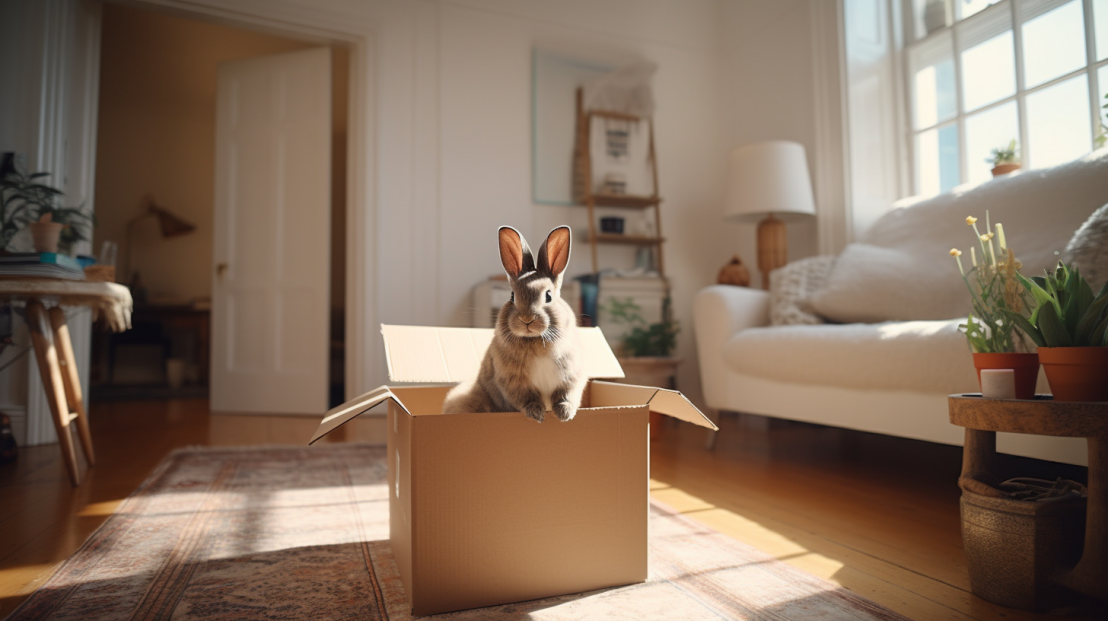Understanding the Rabbit’s Digestive System
Rabbits are adorable and curious creatures known for their unique dietary preferences. As responsible rabbit owners, it’s crucial to understand what rabbits can and cannot eat to ensure their well-being. One common question that often arises is, “Can rabbits eat cardboard?” Cardboard can pose several health risks to Rabbits and should not be fed to them. Let’s dive into the topic and explore the intricate details of a rabbit’s diet.
A Herbivorous Lifestyle
Rabbits have a specialized digestive system designed for a herbivorous lifestyle. As herbivores, they rely on plant-based foods to meet their nutritional needs. Their teeth are continuously growing, allowing them to consume fibrous foods such as hay, fresh vegetables, and herbs.
An Efficient Process
Rabbits are considered hindgut fermenters, which means their digestion takes place in two stages. Initially, they chew food, breaking it down into smaller particles, and then pass it into their stomach. Later, the food enters the lower intestine, where the fermentation process occurs.
This unique digestive system enables rabbits to extract maximum nutrition from their diet, particularly from the fibrous components like hay and grass.
Can Rabbits Safely Consume Cardboard?
It’s important to note that while rabbits exhibit curiosity and may nibble on various objects, not everything is safe for them to consume. Cardboard, despite being part of their environment, may pose risks to their health.
Potential Dangers
When it comes to cardboard consumption, there are a few potential dangers that rabbit owners should be aware of:
Choking Hazard
When rabbits chew on cardboard, small pieces can break off and cause a choking hazard. These pieces could get lodged in their throat, leading to respiratory distress and potential complications. Therefore, it’s important to monitor your rabbit closely if they have access to cardboard.
Digestive Obstruction
Another risk associated with rabbits eating cardboard is digestive obstruction. If a rabbit ingests a large amount of cardboard, it can lead to blockages in their digestive system. The fibers in cardboard are not easily digestible, and they can accumulate in the intestines, causing discomfort, pain, and potentially life-threatening complications.
Given these risks, it’s crucial to ensure that your rabbits do not have unrestricted access to cardboard and other potentially hazardous materials.

Optimal Diet for Rabbits
Now that we have discussed the potential risks of rabbits eating cardboard, let’s shift our focus to the optimal diet for these adorable creatures. Providing your rabbit with a well-balanced and nutritionally-rich diet is crucial for their overall health and well-being.
The Importance of Hay
The foundation of a rabbit’s diet should primarily consist of fresh, high-quality grass hay. Hay is not only a great source of essential fiber but also aids in digestion and helps maintain dental health. The constant chewing required when eating hay helps wear down a rabbit’s teeth, preventing them from becoming overgrown.
Consider offering varieties of hay such as Timothy hay, Orchard grass, or Meadow hay. These types of hay are readily available and provide the necessary fiber content for a rabbit’s digestive system to function optimally.
Nutritious Fresh Vegetables
In addition to hay, rabbits can enjoy a variety of fresh vegetables as part of their diet. Vegetables provide essential nutrients and hydration for your furry friend. Here are some safe and healthy options to consider:
- Leafy greens: Kale, spinach, romaine lettuce, and cilantro are excellent choices. Introduce new vegetables gradually to avoid digestive upset.
- Cruciferous vegetables: Broccoli florets, Brussels sprouts, and cauliflower can be included in their diet in small quantities.
- Bell peppers: Red, green, or yellow bell peppers make for a tasty and nutritious addition to a rabbit’s vegetable repertoire.
Remember to wash all vegetables thoroughly and remove any pesticides or dirt before offering them to your rabbit. Aim to provide a variety of vegetables to ensure a well-rounded diet.
Limited Pellets and Treats
While hay and fresh vegetables should form the core of a rabbit’s diet, commercial pellets can be included in limited quantities. Pellets can provide additional nutrients but should only make up a small portion of their overall food intake. Look for high-quality pellets that are specifically formulated for rabbits and avoid those with added sugars.
Treats should be given sparingly and should also be selected with caution. Opt for healthy and rabbit-safe treats such as small pieces of fruit (e.g., apple slices) or herbs (e.g., parsley). It’s important to note that treats should never replace the main components of a rabbit’s diet.
Regularly monitor your rabbit’s weight and adjust the amount of pellets and treats accordingly to prevent obesity or nutrient imbalances.
Safe Alternatives to Cardboard
Since cardboard is not a recommended dietary item for rabbits, it’s important to provide them with safe alternatives that satisfy their chewing instincts. Here are a few options to consider:
Chew Toys and Treat Dispensers
Chew toys and treat dispensers designed specifically for rabbits can redirect their chewing behavior away from cardboard. These toys provide both physical and mental stimulation, promoting a healthier and more enriching environment for your furry friend. Some popular options include:
| Toy Name | Material |
|---|---|
| Willow Ball | Natural willow branches |
| Cardboard Chew Rings | Rabbit-safe cardboard |
| Treat Dispensing Ball | Durable plastic with openings |
Wooden Blocks and Sticks
Natural wooden blocks or sticks, such as applewood or willow, can serve as safe alternatives to cardboard for rabbits to chew on. These options not only provide a satisfying chewing experience but also help wear down their ever-growing teeth. Ensure the wood is untreated and clean before offering it to your rabbit.
Cardboard Alternatives
If you’re looking for safe options similar to cardboard, consider providing your rabbit with brown paper bags or hay-based chew mats. These alternatives offer a satisfying chewing experience without the associated risks.
Frequently Asked Questions
Q: Can rabbits eat cardboard tubes?
A: It is best to avoid offering cardboard tubes for rabbits to consume. While they may enjoy playing with tubes, there is still a risk of ingesting small pieces, leading to choking or digestive obstruction.
Q: What should I do if my rabbit accidentally eats cardboard?
A: If you suspect that your rabbit has ingested a significant amount of cardboard, monitor their behavior and look for signs of distress. Contact your veterinarian immediately if you notice any unusual symptoms such as difficulty breathing, lack of appetite, or changes in bowel movements.
Q: Can rabbits eat paper or cardboard-based bedding?
A: Although paper-based bedding is commonly used for rabbits’ litter boxes or cages, it is essential to ensure they are not consuming large quantities of it. Consuming excessive paper or cardboard-based bedding can cause digestive issues, so it’s crucial to provide alternative forms of enrichment.
Remember, the health and well-being of your rabbit should always be your top priority. Providing a safe and nutritionally-balanced diet, along with appropriate alternatives to cardboard, will help ensure a happy and healthy life for your furry companion.
Hey there, fellow nature enthusiasts! I’m Mark Gray, the passionate owner of OutdoorAnimals.com, a hub dedicated to uncovering the incredible world of outdoor animals. Whether you’re a hiker, a four-wheeler, or just someone who revels in the beauty of the great outdoors, you’re in the right place. I seek to understand all varieties of animals, from the great elk to the simple mouse, my goal is to write and share this knowledge with the public.

